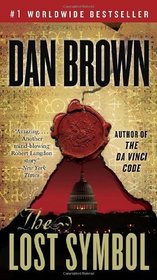Helpful Score: 22
This must be one of the worst books I have ever read. If you've read Angels & Demons or Da Vinci Code, then you've read a better version of the same story. Really - the same plot, same themes, but the story itself gets sillier as Brown runs out of material. And in the end, all he's really doing is indulging himself. How do things like this even get published? I will say one thing, I have officially decided to never read Dan Brown again.
Helpful Score: 14
I just finished this book. I must say I am terribly disappointed. It lacked the originality of Da Vinci Code and Angels & Demons. I found it very poorly written in general. It was fairly predictable, in my opinion. I only really liked the character of Ma'Lakh.
Helpful Score: 11
The short review: The Lost Symbol is not as boring as my latest history textbook, but it's not for the lack of trying. The Lost Symbol is not even close to meeting the expectations set by Angels and Demons. Honestly, it seems like a half-hearted rewrite.
The longer review: I bought this audio book to occupy my time on the hour long commute to work. The story's mystery was the only thing that kept me from turning it off as The Lost Symbol is a bit redundant. (And by "a bit" I mean very.) I found myself losing interest in the repetitive history lectures wrapped in symbolism.
In what I assume is an attempt to draw out the story (was Dan Brown paid per page?) the mystery is blatantly interrupted by Masonic history and explanations of symbols that might have been cut and pasted from wikipedia (I'm not saying it was plagiarized. It is just that dry). For instance, "[a] disturbing object -- artfully encoded with five symbols -- is discovered in the Capitol Building. Langdon recognizes the object as an ancient invitation... one meant to usher its recipient into a long-lost world of esoteric wisdom." When the the meanings of the five symbols and the apparent invitation is explained, the story could have been shortened and the plot could have carried on. Instead, the symbolism was hashed, then rehashed and then reviewed again...just in case you slept through it the first time.
The longer review: I bought this audio book to occupy my time on the hour long commute to work. The story's mystery was the only thing that kept me from turning it off as The Lost Symbol is a bit redundant. (And by "a bit" I mean very.) I found myself losing interest in the repetitive history lectures wrapped in symbolism.
In what I assume is an attempt to draw out the story (was Dan Brown paid per page?) the mystery is blatantly interrupted by Masonic history and explanations of symbols that might have been cut and pasted from wikipedia (I'm not saying it was plagiarized. It is just that dry). For instance, "[a] disturbing object -- artfully encoded with five symbols -- is discovered in the Capitol Building. Langdon recognizes the object as an ancient invitation... one meant to usher its recipient into a long-lost world of esoteric wisdom." When the the meanings of the five symbols and the apparent invitation is explained, the story could have been shortened and the plot could have carried on. Instead, the symbolism was hashed, then rehashed and then reviewed again...just in case you slept through it the first time.
Helpful Score: 8
I have to say I liked this book! Not as good as DaVinci Code or Angels & Demons but still a page turner. Very much reminded me of the movie National Treasure though. I figured out pretty much where it was leading but it was still fun seeing Langdon figuring everything out. I can already see this one being made into a movie-and I will definately see it!
Helpful Score: 5
This book is the long awaited 3rd book in the Robert Langdon series by Dan Brown. It is NOT the best of the three. It had an interesting premise and lots of plot twists and turns, but also spent a number of pages preaching about certain theories and aspects of the book that made my eyes glaze over. I think that the "bad guy" in this book is the most interesting character as he is truly the one character that moves the plot line along. This book also took significantly longer than the previous two Robert Langdon books to really "hook" the reader.





